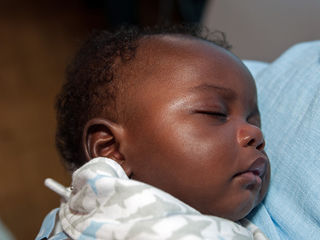Sleep
Sleep: Essential to Intelligence, Health, and Happiness
12 reasons sleep is important, and 12 ways to ensure your child gets enough.
Posted August 30, 2018

Curious, imaginative, and anxious children can have a hard time getting the sleep they need. So can kids who are experiencing change, stress, or disruption. For all children, and for these children especially, their intelligence, health, and happiness depend on their getting enough sleep.
How Much Sleep Do Babies, Children, and Teenagers Need?
After a thorough study of all the research on sleep, members of the American Academy of Sleep Medicine made the following recommendations for the optimal health of infants, children, and teens:
- 4 to 12 months: 12 to 16 hours per 24 hours (including naps)
- 1 to 2 years: 11 to 14 hours per 24 hours (including naps)
- 3 to 5 years: 10 to 13 hours per 24 hours (including naps)
- 6 to 12 years: 9 to 12 hours per 24 hours
- 13 to 18 years: 8 to 10 hours per 24 hours
(For infants from birth to 4 months, there is too much variability and insufficient evidence to make recommendations.)
Why Is Sleep Important?
- Memory consolidation. During sleep, the brain is actively sorting and storing information from the day’s activities.
- Brain cleaning. Sleep is the brain’s housekeeping period, when the toxins that build up during waking hours are flushed out.
- Creative connections. The sleeping brain makes connections from the day’s experiences to previous learning, leading to inferences, associations, problem-solving and deeper-level learning.
- Emotion regulation. Those who don’t get enough sleep tend to be more anxious, irritable, and moody, and less able to manage their emotions.
- Attention, impulse control, and concentration. Insufficient sleep leads to distractability, impulsivity, and reduced ability to concentrate, sometimes to the point of mimicking symptoms of Attention Deficit Hyperactivity Disorder.
- Learning and academic success. Kids who get enough sleep learn more easily, and do better academically.
- Judgement. Good judgement depends on adequate sleep. Those who don’t get enough sleep tend to react to irrelevant factors with the same intensity as more important issues.
- Behavior. Somewhat predictably, with impaired emotion regulation and judgement, children who don’t get enough sleep are more likely to present behavior problems.
- Physical health. Being well-rested is good for the immune system, helping to prevent and fight infections and many kinds of disease.
- Physical growth and repair. The pituitary gland releases growth hormone during sleep, which the body requires for growth, fat breakdown, and repair.
- Weight control. Insufficient sleep is associated with obesity and diabetes. Sleep modulates the neuroendocrine system and glucose metabolism.
- Energy and well-being. Well-rested people feel better. They’re more positive and energetic.
The American Academy of Sleep Medicine concluded from the accumulated research studies that, “Regularly sleeping fewer than the number of recommended hours is associated with attention, behavior, and learning problems. Insufficient sleep also increases the risk of accidents, injuries, hypertension, obesity, diabetes, and depression. Insufficient sleep in teenagers is associated with increased risk of self-harm, suicidal thoughts, and suicide attempts.”
Help Your Child Get the Sleep They Need
- Make time for outdoor play. Kids (like adults) sleep better when their bodies are tired, when they’ve had enough fresh air and exercise through the day.
- Be kind, loving, and attentive. Bedtime is a time of separation, which many children worry about. As bedtime approaches, be especially attentive to ensuring your child feels safe and listened to, secure in your love.
- Create a healthy sleeping environment. Work to ensure your child’s sleeping place is clean, safe, quiet, and dark, and a comfortable temperature.
- Create a calm, dependable, bedtime routine. After brushing teeth, washing, and getting into soft, comfortable sleep clothes, make time to read, snuggle, and chat with your child. This is not a time for stressful arguments or challenge. Don’t rush through this; try to act as if you have all the time in the world.
- Make it consistent. A reasonably consistent bedtime and nap schedule, across seven days of the week, helps ensure the highest quality of sleep.
- Turn it off! Make sure there are no electronic devices in your child’s room, and try to give them at least a one-hour holiday from technology before bedtime.
- Stay away from sugar at bedtime. Eating sweets near bedtime causes a spike in blood sugar, followed later by a drop, which leads to hunger in the middle of the night. You might try instead a small amount of some of these foods before bed: almonds, walnuts, milk, cottage cheese, bananas, kiwi, oatmeal.
- Mindfulness exercises. Even in young children, mindfulness practices reduce insomnia, and improve sleep. A very simple one: Teach your child to pay attention to their breath, counting to five as they breathe in, then again to five as they breathe out. Have them do that five times, then another five if they’re still awake.
- Help your child feel safe. Address bedtime fears, don’t dismiss them. Listen and reassure. In response to questions or concerns, tell your child how you are keeping them safe. Perhaps a stuffed animal can become the “Guard Bear,” and stand at the door. A night light might help. Look under the bed and in any other secret places the child might worry about, reporting that each place is clear and clean. “All safe here.”
- Focus on calm and relaxation, rather than sleep. If your child has trouble shutting down their brain for the night, don’t insist on their going to sleep. Instead, provide techniques for relaxing their body and calming their mind. They might enjoy visualizing places or situations that make them feel happy.
- Count your blessings. Together with your child, make a mental list of the good things that have happened today, the kind words or deeds, the sources of happiness the day has provided. You might try singing the list as a lullabye to your child.
- Set an intention for the morning. Ask your child to think about what they want to experience or achieve tomorrow. For example, “I will wake up in the morning feeling refreshed and ready for the day,” or “Tomorrow I’m going to spend some time painting.”
A calm and dependable bedtime routine sets the stage for a healing regenerative sleep, and a happier, more productive day tomorrow.
For More on Sleep
- “Consensus Statement of the American Academy of Sleep Medicine on the Recommended Amount of Sleep for Healthy Children,” by Shalini Paruthi, et al.
- “How Sleep Clears the Brain,” by the National Institutes of Health
- “New Sleep Guidelines for Babies, Children, and Teens,” by Mary Brophy Marcus
- “What Happens in the Brain During Sleep?” by John Peever and Brian Murray
- “The Science of Sleep,” by Johns Hopkins Medicine
- “7 Amazing Things that Happen to Your Body While You Sleep,” by Queensland Health
- “How Much Sleep Do Kids Need?” by Lia Grainger
- “Snooze or Lose,” by Po Bronson
- “How to Keep Your Child Well-Rested During the Holiday Season,” by Alanna McGinn
- “10 Tips to Get Your Kids to Sleep,” by Karen Gill
- “What We’ve Learned about Kids and Sleep in 2015,” by The Huffington Post
- “The Nine Best Foods to Eat Before Bed,” by Brianna Elliott
- “Bedtime Checklist for Curious, Creative, Imaginative Kids,” by Dona Matthews
- “How Much Sleep Does Your Child Need?” by Joseph Buckhalt
- “How Much Sleep Are Children Getting?” by Joseph Buckhalt
- “How Much Sleep is Required for Optimal Health? Age Matters,” by Christopher Bergland
- “Sleep Loss Disrupts Emotional Balance via the Amygdala,” by Christopher Bergland


